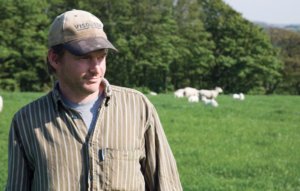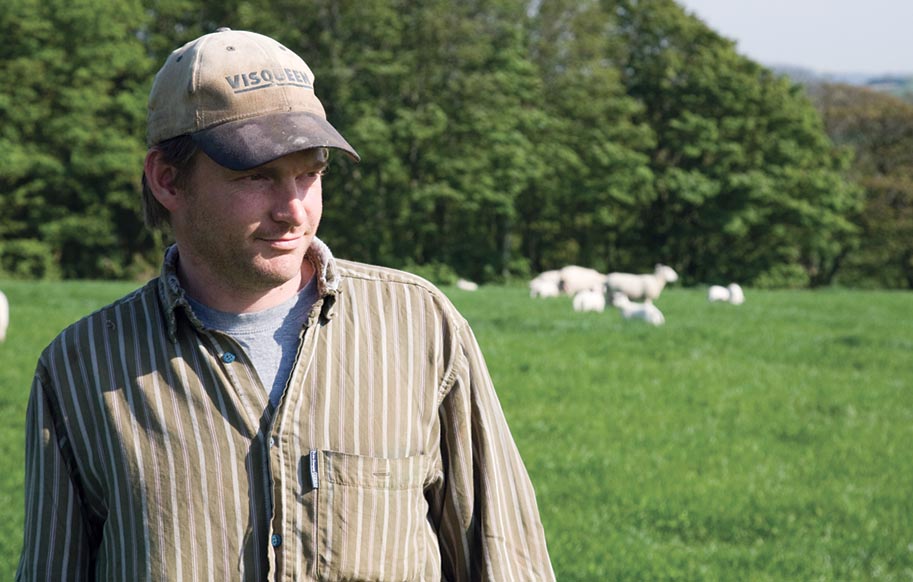 Roz Whistance meets a farmer who has made a virtue of the self-reliance of his pedigree sheep
Roz Whistance meets a farmer who has made a virtue of the self-reliance of his pedigree sheep
“Last week we’re all getting more prosperous; this week there are world food riots. Last week crops-for-fuel was the eco-wonder; this week it’s an eco-disaster.” So ponders Tony Coward, award-winning Island sheep farmer. Against the ever-changing economic situation he hopes to achieve success. But it is a fine line to walk.
“It is pointless asking sheep to make a cup of tea,” says Tony. “But there is nothing wrong with asking them to be sheep.” That philosophy led to his pedigree flock being awarded “Best Overall Flock” in the southern area by the Lleyn Sheep Society.
“I say, ‘If you’re hungry I’ll feed you, if you’re pregnant I’ll look after you and if you’ve lambed I’ll look after your lambs. But otherwise just be sheep.’ The sheep need to be pretty self-sufficient: his labour force has reduced but the size of the flock has had to increase for the farm to remain viable. “Lambing outside we monitor them closely, but with no need to pen or feed the ewes the sheep are doing much of the work I used to have to do myself.”
Tony is delighted with the award. “There are about 1500 flocks in the society and mine was judged one of the best. And I’d never entered before!” It is a massive endorsement for a young farmer whose every decision affects the prosperity of the farm. He rather hopes farming will provide a living for his children, Eleanor, five, and Tom, two.
Quality, rather than quantity, was always imperative, Tony’s first 20 Lleyn ewes providing the foundation for the 600 he has today. It also means he has a flock well suited to the appropriately-named Hill Farm. From the top of his 350 acres in Gatcombe you can see way past the curvy walls of Carisbrooke Castle to Southampton, Portsmouth and beyond.
Many of Tony’s lambs will be sold as breeding sheep for other farmers, whilst the best will remain to expand the flock: but keeping the additional sheep is expensive. “We are keeping a larger number of sheep with fewer lamb sales to support them. We finish selling last year’s lambs in March and we don’t start to sell this years’ until August, but the bills keep coming in. I now have to find £1000 to pay for Blue tongue vaccine.”
Tony started farming with his wife Sarah’s father, Robert. “Robert managed the things that grew standing still while I managed the things that ran around and grew.” Robert’s death two years ago meant some hard thinking was needed. Then, wheat was just £60 per tonne so the arable machinery was sold and Tony committed to expanding the sheep flock. Now the wheat price has tripled. “It was still the right decision; people eat meat as well as bread, and the land needs the fertility that only stock can provide.”
 Meeting Tony, you realise that farming is as much cerebral as muscular. The mental juggling is constant. At 39 he is unusually young to be a farmer. He enthuses about a mobile sheep pen that has revolutionised his life, yet he is as cynical as any wizened old farmer about the paperwork that accompanies his every activity both on and off the farm. “Nine separate pieces of paper are required before I can load the lorry with sheep. Just give me a certificate in common sense!”
Meeting Tony, you realise that farming is as much cerebral as muscular. The mental juggling is constant. At 39 he is unusually young to be a farmer. He enthuses about a mobile sheep pen that has revolutionised his life, yet he is as cynical as any wizened old farmer about the paperwork that accompanies his every activity both on and off the farm. “Nine separate pieces of paper are required before I can load the lorry with sheep. Just give me a certificate in common sense!”
With the paperwork go the costs. Obtaining a sheep health accreditation cost £4500 last year, but this will allow him to put his sheep in front of buyers at the Breed Society sales at Exeter, Ross-on-Wye and Carlisle, where he hopes they will be worth a bit of extra money.
Tony’s last sale trip last Autumn was jinxed by a sheep trade decimated by the Foot and Mouth outbreak. He brought half the sheep back home, unsold.
The 2001 outbreak of Foot and Mouth caused a similar crash, so the family got involved in Farmer’s Markets and direct selling. “We made a large disaster into a slightly smaller disaster,” he says. But the time and money spent selling direct isn’t cost effective, although as a learning exercise it has been invaluable. Now, as Tony says, “we don’t sell lamb, we let people buy it.”
Instead he concentrated on building up his flock. And for all that the stock are related to the money they bring in, Tony dotes on his pretty, whiter-than-white Lleyns. “I think they’re fascinating creatures. They’re a bit like me: stubborn and independent.”
Hill Farm Lamb is available in boxes. Call Tony on 01983 527138.



